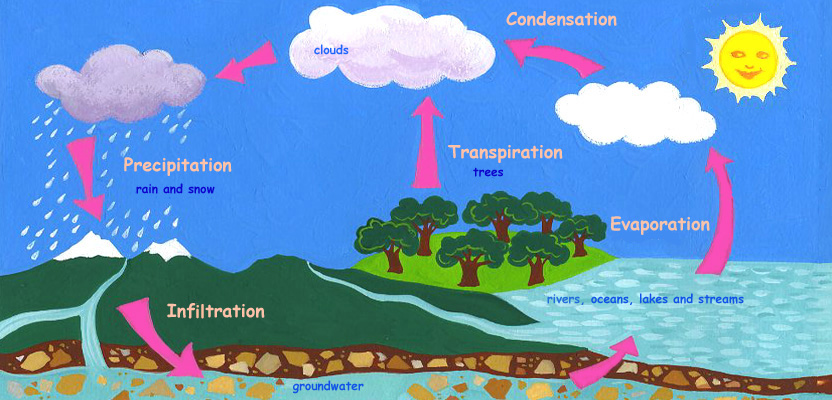Final Assessment
Rock Cycle
1) How does a metamorphic
rock become a sedimentary rock?
-First, metamorphic
rock cools down, called crystallization, and break down by weathering.
It turns into sediments. Then, erosion moves the
sediments into water area. Next, compaction and cementation glue
the sediments into sedimentary rock.
2) How does magma change
into a metamorphic rock?
-First, crystallization happens. Magma cools
down, and it becomes igneous rock. Then, heat and pressure cause
igneous rock turns into metamorphic rock.
Carbon Cycle
3) How does a consumer
become a fossil fuel?
-After consumers die, decomposers break
down the organism, called decomposition. This process continues
million of year, and turns into fossil fuel.
4) How can a fossil fuel
be used in photosynthesis?
-First, fossil
fuel burned by factory. It produces carbon dioxide,
called CO2 emission. Consumption produces CO2 to the atmosphere. Producers use sunlight,
water and CO2 to produce oxygen, called photosynthesis.
Water Cycle
5) How does lake water
turn into a cloud?
-Sunlight heats
the water from lake or ocean, called evaporation. It also heat the
water from plants, called transpiration. They turn into water
vapor. It makes clouds, and bigger, called condensation.
6) How can a cloud turn
into groundwater?
-First, when clouds are
big enough to rain, called precipitation. Then, water runoffs to
soil. Next, water goes into ground, called infiltration, and
becomes groundwater.
Essential Questions:
1) How are the rock,
carbon, water cycles connected to the hydrosphere, lithosphere, atmosphere and
biosphere?
-
In hydrosphere, which means water, connected to all
three cycles. Weathering breaks down igneous rock into sediments,
and erosion moves the sediments to ocean. Producers also
talk water from groundwater, and produce oxygen (photosynthesis). Consumers take
in oxygen, and produce carbon dioxide. After they die, decomposers break
down the organism, and become fossil, and fossil is sedimentary
rock. In addition, when precipitation happen, water runoffs to
soil, and goes underground, and become groundwater. All those cycle connected
to each other and hydrosphere.
In lithosphere, which means land/soil,
connected to all three cycles. When precipitation happens, water runoffs and
goes into soil. Plants need those cycle to grow, and produce oxygen, When rock
forms from sedimentary rock to metamorphic rock, it happens
underground, includes compaction and cementation.
In atmosphere, which means gas, connected to
all three cycles. For example, when volcano erupts, lava comes
out, and produces CO2 to atmosphere. In addition, when factory burns
fossil fuel to produce CO2 into atmosphere, called CO2 emission. Sunlight also
heats the water from ocean and plant. It turn into water vapor, and
makes cloud, called condensation. Those cycles connected to
atmosphere.
In biosphere, which means living thing. Producers and
consumers are living organism. They produce oxygen and carbon dioxide. Plants
also need water from precipitation and groundwater to survive. The extremely
hot temperature can destroy surrounding living things. Therefore, all three
cycle connected to biosphere.
2) How are the three
cycles connected to each other?
-First, weathering or precipitation breaks
down the rock into sediments, and erosion moves
the sediment to ocean. Then, the water pressure squeezes the
sediments into sedimentary rock and metamorphic rock. In
addition, precipitation also give water to producers, which use to
produce oxygen, and exchanges CO2 from consumers.
After they die, they turn to fossil, and fossil is sedimentary
rock. In conclusion, all three cycles are connected to each other.


